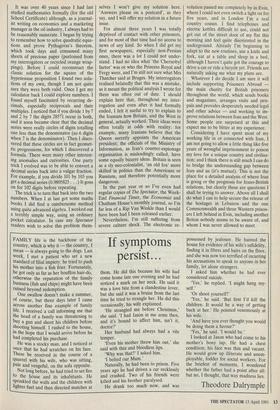If symptoms
persist...
FAMILY life is the backbone of the country, which is why it — the country, I mean — is always going to the dogs. Last week, I met a patient who set a new standard of filial impiety: he tried to push his mother into a fish frier. Fortunately, he got only as far as her bouffon hair-do, otherwise the reputation of the family business (fish and chips) might have been ruined beyond redemption.
One swallow doesn't make a summer, of course, but three days later I came across another fine example of family life. I received a call informing me that the head of a family was threatening to buy a gun and shoot his children before shooting himself. I rushed to the house, in the hope that I would arrive before he had completed his purchase.
He was a stocky man, and I noticed at once that he had scratches on his face. These he received in the course of a quarrel with his wife, who was sitting, pale and vengeful, on the sofa opposite. Not long before, he had tried to set fire to the house and its inhabitants. He sprinkled the walls and the children with lighter fuel and then directed matches at them. He did this because his wife had come home late one evening and he had noticed a mark on her neck. He said it was a love bite from a clandestine lover, but she said it was a bruise from the last time he tried to strangle her. He did this occasionally, his wife explained. 'He strangled me before Christmas,' she said. `I had Jason in me arms then, and it's bound to affect him, isn't it, doctor?'
Her husband had always had a vile temper. 'Even his mother threw him out,' she said with thin and bloodless lips.
'Why was that?' I asked him. `I belted our Mum.'
Naturally, he had been to prison. Five years ago he had driven a car recklessly and crashed. Two of his friends were killed and his brother paralysed.
He drank too much now, and was possessed by jealousy. He hunted the house for evidence of his wife's infidelity, finding it in fibres and hairs on the floor, and she was now too terrified of incurring his accusations to speak to anyone in her family, let alone strangers.
I asked him whether he had ever considered suicide.
'Yes,' he replied. 'I might hang my- self.'
`Or shoot yourself?'
`Yes,' he said. 'But first I'd kill the children. It would be a way of getting back at her.' He pointed venomously at his wife.
`And have you ever thought you would be doing them a favour?'
`Yes,' he said. 'I would be.'
I looked at Jason who had come to his mother's bony lap. He had a chest condition; his face was thin and vacant. He would grow up illiterate and unem- ployable, fodder for social workers. For the briefest of moments, I wondered whether the father had a point after all: but no, I thought, that way madness lies.
Theodore Dalrymple


























































 Previous page
Previous page